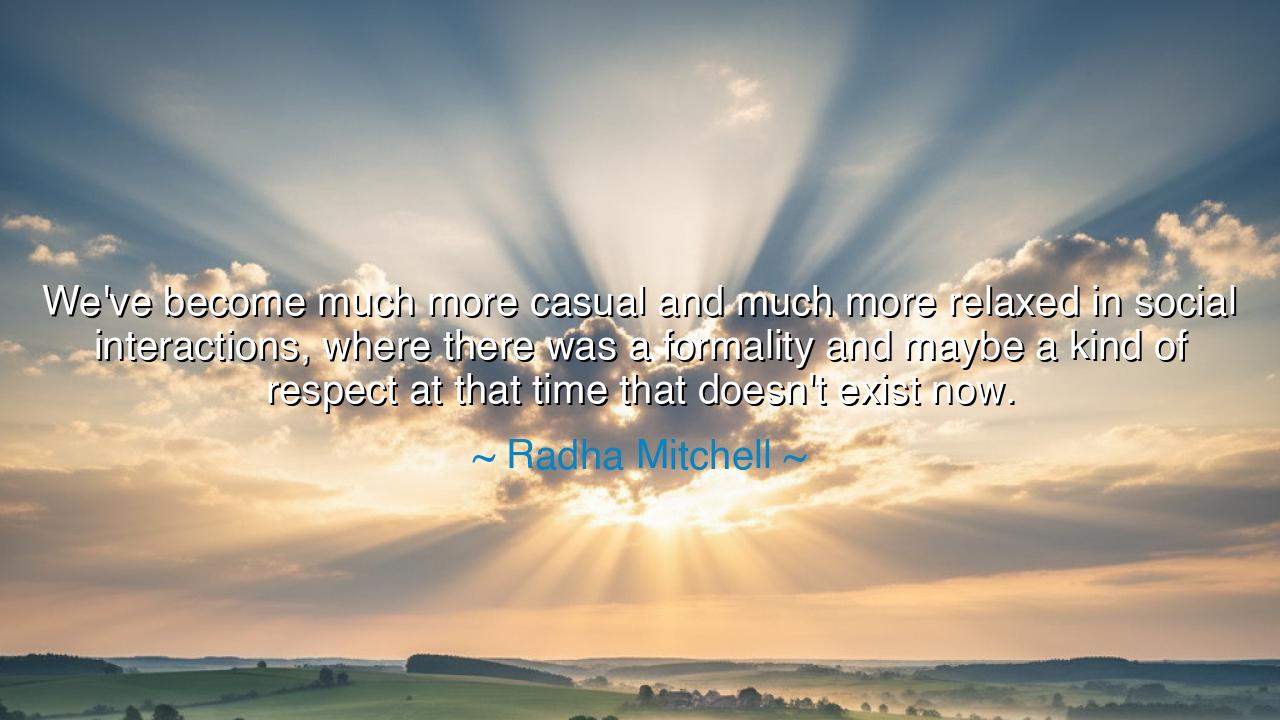
We've become much more casual and much more relaxed in social
We've become much more casual and much more relaxed in social interactions, where there was a formality and maybe a kind of respect at that time that doesn't exist now.






"We've become much more casual and much more relaxed in social interactions, where there was a formality and maybe a kind of respect at that time that doesn't exist now." — Radha Mitchell
Hear now the lament of the modern age, spoken through the voice of Radha Mitchell, whose words carry both sorrow and truth. She speaks of a world that has grown casual, where formality — once the guardian of grace — has faded like an old melody forgotten by its players. Once, every greeting was a gesture of honor, every word a bridge of meaning. Men and women met each other with dignity, mindful that behind every face lived a soul deserving of respect. But now, in the age of haste and convenience, our manners have grown weary, our words too quick, our reverence too small.
The ancients knew that formality was not vanity, but a sacred language of regard. A bow, a handshake, a carefully chosen phrase — these were rituals that reminded man of his shared humanity. In the courts of old, in temples and marketplaces alike, the way one spoke or stood before another reflected the state of the heart. Respect was not demanded, it was woven into the fabric of daily life. But as Mitchell observes, our times have traded that subtle grace for ease and informality. We speak faster, interrupt more freely, and forget that tone and timing, too, are acts of kindness.
Yet her words are not a condemnation, but a reflection — a mirror held up to a society that has mistaken comfort for connection. The relaxed and casual ways of modern interaction have brought us closeness, yes, but at a cost: the loss of depth. The warmth of informality can be a blessing, but when it erases respect, it becomes a shadow of true relationship. For familiarity without reverence breeds disregard, and ease without awareness becomes indifference. A smile may replace a bow, but if the heart is careless, both gestures ring hollow.
Consider the story of Queen Victoria and her servant, Abdul Karim, a friendship born across the boundaries of empire and culture. Though she was the ruler of a vast dominion, Victoria addressed him with honor, even calling him “the Munshi,” her teacher. Their relationship was not defined by formality alone, but by mutual respect, rooted in the traditions of a time when every rank and role carried purpose. Even in friendship, there was dignity — a recognition of the sacred in each human being. It was a balance of warmth and reverence, the very harmony Mitchell mourns as lost.
In our modern gatherings — whether in digital halls or face-to-face encounters — we too often forget the ancient art of presence. We speak before we listen, jest before we understand, and in our rush to be authentic, we neglect to be considerate. But true authenticity, as the wise have taught, is not the freedom to say whatever we please; it is the discipline to speak truth with grace. Respect is not old-fashioned — it is timeless. It is the golden thread that holds together communities, friendships, families, and nations. Without it, even love becomes fragile.
The wisdom of Radha Mitchell’s words calls us, then, not to abandon our warmth, but to restore our reverence. To bring back the quiet strength of listening, the power of greeting with intention, the humility of acknowledging another’s worth. Let our laughter remain bright, but let it be joined by sincerity; let our speech be free, but not careless. To be relaxed and respectful at once — that is the art of a balanced soul.
So, O children of this fast and fleeting age, learn again the beauty of formality. Do not mistake stillness for stiffness, nor manners for pretense. When you meet others, let your words be mindful, your gestures deliberate, your presence full. For every act of respect is a seed of harmony; every bow of the heart restores a measure of peace to the world. The ancients knew, and Mitchell reminds us: civilizations do not fall by fire or sword alone — they crumble first when respect disappears from speech and from the soul.
Therefore, carry this truth within you: courtesy is not constraint, but reverence in motion. Revive it in your homes, your friendships, your daily exchanges. For when respect returns, so too will the dignity of humanity — and our age, once casual and careless, will remember once more how to honor the sacred bond that connects us all.






AAdministratorAdministrator
Welcome, honored guests. Please leave a comment, we will respond soon